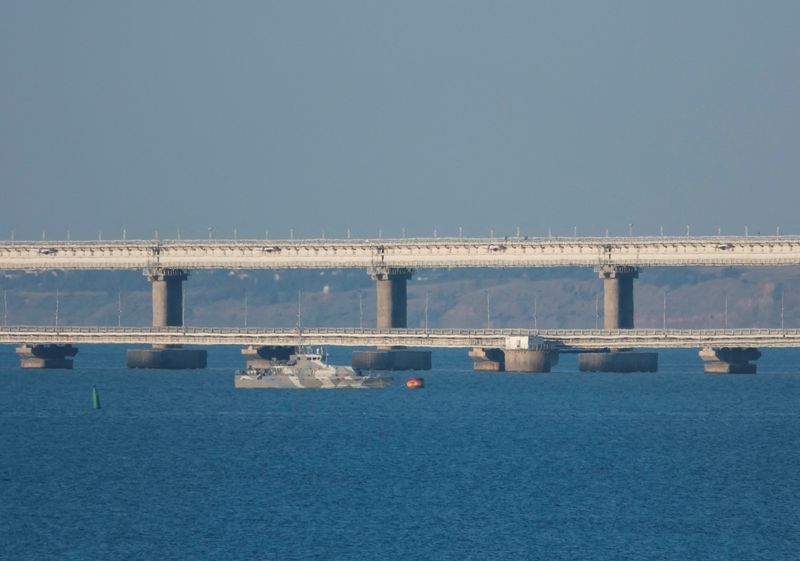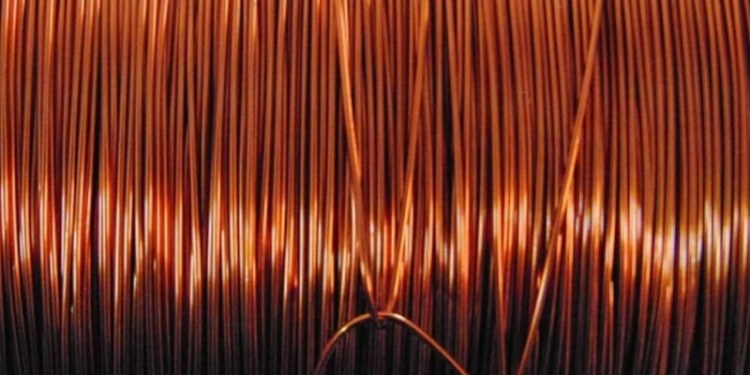2/2

© Reuters. An armed ship sails next to Crimean bridge connecting the Russian mainland with the peninsula across the Kerch Strait, Crimea, July 17, 2023. REUTERS/Stringer
2/2
DASH/USD
+6.70%
Add to/Remove from Watchlist
Add to Watchlist
Add Position
Position added successfully to:
Please name your holdings portfolio
Type:
BUY
SELL
Date:
Amount:
Price
Point Value:
Leverage:
1:1
1:10
1:25
1:50
1:100
1:200
1:400
1:500
1:1000
Commission:
Create New Watchlist
Create
Create a new holdings portfolio
Add
Create
+ Add another position
Close
By Guy Faulconbridge
MOSCOW (Reuters) – Russia halted participation on Monday in the year-old U.N.-brokered deal which lets Ukraine export grain through the Black Sea, just hours after a blast knocked out Russia’s bridge to Crimea in what Moscow called a strike by Ukrainian sea drones.
Russia said two civilians were killed and their daughter wounded in what Moscow cast as a terrorist attack on the road bridge, a major artery for Russian troops fighting in Ukraine.
The Kremlin said there was no link between the attack and its decision to suspend the grain deal, which it says must also ease restrictions on Russian food and fertilizer exports.
“In fact, the Black Sea agreements ceased to be valid today,” Kremlin spokesman Dmitry Peskov told reporters on a conference call. “Unfortunately, the part of these Black Sea agreements concerning Russia has not been implemented so far, so its effect is terminated.”
Images showed a section of the road bridge had come down and traffic was halted in both directions, although a parallel railway bridge was still operational. Blasts were reported before dawn on the 19-km (12-mile) bridge, which Russian President Vladimir Putin ordered built after seizing and annexing the peninsula from Ukraine in 2014.
Kyiv gave no official account of the blasts. It typically does not comment on reports of attacks in Crimea or in Russia, but has long maintained that the bridge was built illegally, and its use by Russia for military supplies makes it a legitimate target. Russia reopened the bridge after it was last hit by a massive explosion and fire in October.
Russia’s suspension of the Black Sea grain deal could drive up food prices across the globe, especially in the poorest countries. Ukraine and Russia are both among the world’s biggest exporters of grain and other foodstuffs.
The grain deal was hailed as preventing a global food emergency when it was brokered by the United Nations and Turkey last year, halting a de facto blockade of Ukrainian ports by Russia, which agreed to let ships pass after inspections in Turkey.
Turkish President Tayyip Erdogan, the deal’s powerful sponsor, said he still believed Putin wanted it to continue. The Russian and Turkish foreign ministers would talk later on Monday, he told reporters.
“I hope that with this discussion, we can make some progress and continue on our way without a pause,” Erdogan said.
Global commodity food prices rose on Monday, though the increase was limited, suggesting traders did not yet anticipate a severe supply crisis. The Chicago Board of Trade’s most active wheat Wv1 contract was up 3.0% at $6.81-3/4 a bushel at 1056 GMT after earlier rising over 4%.
Putin had threatened last week to suspend participation in the grain deal, while also saying Russia could return to it if its demands were met for easier rules for its own agriculture and fertilizer exports.
Alongside the Black Sea grain deal, a three-year deal was struck last year under which U.N. officials agreed to help Russia get its food and fertiliser to foreign markets.
Moscow says those terms have not been fully implemented. Western countries say Moscow is trying to use its leverage over the grain deal to weaken financial sanctions, which do not apply to Russia’s agricultural exports.
“We can suspend our participation in the deal, and if everyone once again says that all the promises made to us will be fulfilled, then let them fulfil this promise. We will immediately rejoin this deal,” Putin said last week.
European Commission President Ursula von der Leyen described Russia’s suspension of the agreement as a “cynical move” and said the EU would continue to try to secure food for poor countries.
WITHOUT RUSSIA?
Russia has agreed three times in the past year to extend the Black Sea deal, despite repeatedly threatening to walk out. It briefly suspended participation at the end of October last year after an attack on its fleet by seaborne Ukrainian drones, leading to a few days when Ukraine, Turkey and the United Nations kept exports going under the deal without Moscow.
Denys Marchuk, deputy head of the Ukrainian Agrarian Council, the main agribusiness organisation in Ukraine, sounded bullish about the prospect of again continuing seaborne exports without Russia’s participation.
“As an option, why don’t we assess the possibility of the continuation of the grain deal without Russia? We had experience of this already in November 2022,” he told Reuters. “If there will be safety guarantees from our partners, then why not conduct the grain initiative without Russia’s participation?”
The blast on Russia’s bridge to Crimea follows months of Ukrainian strikes on Russian supply lines as Kyiv pursues a counteroffensive to drive Russian forces out of its territory.
Unverified imagery showed a section of road on the bridge had split and was listing to one side, with metal barriers buckled. Dash cam footage showed drivers braking sharply shortly after the incident.
The Ukrainian military initially suggested the attack could be some kind of provocation by Russia itself; Ukrainian media later cited unidentified sources as saying Ukraine’s Security Service was behind it.
The Ukrainian counteroffensive, which began last month, has so far been slow going, capturing a string of small hamlets in the south and some territory around Bakhmut, the small eastern city Russia captured in May after the war’s deadliest combat. Kyiv said on Monday its forces had captured another 18 sq km of territory over the past week, bringing the total captured to more than 210 sq km.
Source: Investing.com





























